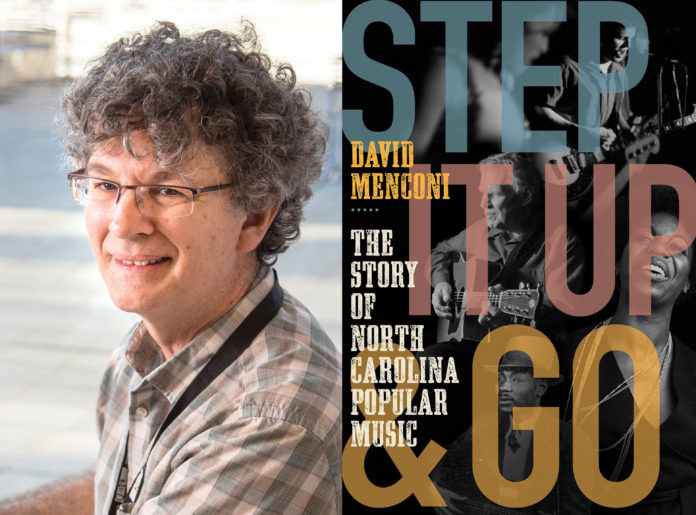
“In the history of American music, there are a small handful of places that tend to be, in importance, head-and-shoulders above everywhere else: New Orleans, Nashville, New York and LA–that’s where everyone goes to be a star,” said author and music critic David Menconi, who recently released his fourth book, Step it Up and Go: The Story of North Carolina Popular Music. “But North Carolina is not far behind and more important than most people probably realize.”
Menconi first began writing as a journalist for a small publication in Boulder, Colorado. When he moved to North Carolina 30 years ago, he continued his work at the Raleigh News & Observer, where he spent 28 years composing pieces about and in critique of the local arts.
“After moving to North Carolina, it quickly became apparent that I had stumbled into a place where there was a story worth telling,” Menconi said.
From the influential plainview blues of Blind Boy Fuller, which the book uses for its name, to the indie and alternative rock of the late 1980s and early 1990s that dominated college radio airwaves, Menconi’s new book covers seemingly ever nook of music in the state’s past and relative present, including stories from artists of various genres that can entertain and bring unknown knowledge to any music fan.
Unlike his past authorial works, Step it Up and Go’s focus is quite broad: the history of music in North Carolina. Constructing a cohesive narrative while dealing with the difficulty that accompanies tackling a topic so wide was a challenging, but rewarding, endeavor for Menconi.
“I really had to approach this book much differently than I have before,” Menconi said. “With my other books, I was able to do all the reporting, researching and interviewing upfront–all at once. With Step it Up and Go, I had to repeat the same procedure for every chapter individually, which made for a very time-consuming and laborious process.”
Despite the scale of the book, Menconi was not overwhelmed. His experience as a music journalist, and the extensive knowledge he gained from it, prepared Menconi to write his overview of the state’s musical history.
“Being a journalist gave me time out in the field–seeing different places, meeting new people and developing my abilities as an interviewer,” Menconi said. “If I did not have my job as a journalist beforehand, completing this book would have been extremely difficult.”
After working on Step it Up and Go for three years, Menconi’s archival account of North Carolina artists and their particularly unique impact on the nation’s musical landscape was published by the University of North Carolina Press, displayed virtually in online bookstores stores but facing the obstacle of selling copies amidst the coronavirus pandemic.
In-person promotions of the book disintegrated as the world suddenly sheltered into collective lockdown. In an interview with the Indy newspaper, Menconi mentioned that, prior to the pandemic, he had plans to curate and emcee a stage at the North Carolina State Fair, which ultimately did not come to fruition.
However, by creating interactive Spotify playlists and using the influence of online interviews, Menconi employed the utility of his unfortunate situation to remain connected with an audience of fans and potential consumers.
“Even though it’s hard to tell how effective these online interactions are in terms of selling books–I can’t see how many people are leaving carrying a copy–that’s okay; writing has always just been a fun hobby for me,” Menconi said. ” As long as I’m grabbing attention and people are enjoying my work, I’m happy.”
On October 19, Menconi spoke alongside Jon Wurster–drummer of the band Superchunk–and Tom Maxwell–lead singer of the Squirrel Nut Zippers–in a discussion hosted by the Chapel Hill bookstore Flyleaf Books.
The interview was conducted using the live video-sharing service Crowdcast, where anyone interested in Flyleaf Books’s upcoming Q&As can reserve a spot and even access a recording of each stream afterwards.
Although connection issues and a suddenly broken computer webcam prevented Menconi from appearing on screen, interactions with attendees through the service’s chatbox tided over attendees until Menconi was able to converse through the speaker of a Flyleaf employee’s phone.
The hour-long session felt like a testament to the perseverance of artists during the pandemic, finding unfamiliar ways to fulfill their desire for artistic expression and continuing to value community despite orders for restrictive interaction.
Even for those born and raised in North Carolina, listening to its music for all their lives, Step it Up and Go is bound to teach readers something new, as it did with its author–who writes about music to pay the bills.
“I definitely learned a lot when writing the book,” Menconi said. “Genres I thought to be novelties at first, like coastal beach music, I learned were actually endearing with rich histories.”











